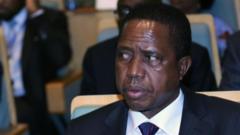As Syria transitions to a new regime, deep-rooted Kurdish distrust poses significant challenges for forming a cohesive national army, reflecting broader ethnic tensions.
Kurdish Skepticism Casts Shadow Over Syria's New National Army

Kurdish Skepticism Casts Shadow Over Syria's New National Army
Diverse ethnic tensions and historical grievances complicate the integration of Kurdish forces into Syria's emerging governmental structure.
In April 2025, the landscape of Syria remains tumultuous as the new governing coalition, born from former rebel factions, strives to unify the country’s armed groups, particularly in the northeastern region predominantly inhabited by Kurdish populations. This attempt at integration is fraught with mistrust, especially considering the historical context of conflict between the Kurdish forces and the rebel factions now in power.
In an effort to bring about stability and embrace a semblance of national unity, the Kurdish-led forces previously engaged in combat with these very rebels have tentatively agreed to merge into a new national army. However, many Kurdish civilians express profound skepticism regarding this collaboration. This skepticism extends from a history of warfare and a shared perception of exclusion from the political process, amplified by the new government's ties to Turkey, a nation historically antagonistic to Kurdish autonomy.
Interviews conducted in late March reveal a palpable sense of unease among Kurdish residents, including a notable voice, Amina Mahmoud, 31, from Kobani, who articulated the collective apprehension by questioning, "How can we trust this new government in Damascus?" This sentiment encapsulates a broader concern that the new national framework may prioritize the interests of the Syrian regime over those of minority groups throughout the region, potentially leaving them exposed and vulnerable.
This wariness is echoed across Syria’s diverse ethnic and religious factions, many of whom are grappling with the challenge of ensuring their voices are heard and needs met under the new governance. As the integration process unfolds, it remains to be seen if the new Syrian government can assuage these fears and foster an inclusive political environment, or if deep-seated mistrust will continue to hinder their efforts for unity and peace.
In an effort to bring about stability and embrace a semblance of national unity, the Kurdish-led forces previously engaged in combat with these very rebels have tentatively agreed to merge into a new national army. However, many Kurdish civilians express profound skepticism regarding this collaboration. This skepticism extends from a history of warfare and a shared perception of exclusion from the political process, amplified by the new government's ties to Turkey, a nation historically antagonistic to Kurdish autonomy.
Interviews conducted in late March reveal a palpable sense of unease among Kurdish residents, including a notable voice, Amina Mahmoud, 31, from Kobani, who articulated the collective apprehension by questioning, "How can we trust this new government in Damascus?" This sentiment encapsulates a broader concern that the new national framework may prioritize the interests of the Syrian regime over those of minority groups throughout the region, potentially leaving them exposed and vulnerable.
This wariness is echoed across Syria’s diverse ethnic and religious factions, many of whom are grappling with the challenge of ensuring their voices are heard and needs met under the new governance. As the integration process unfolds, it remains to be seen if the new Syrian government can assuage these fears and foster an inclusive political environment, or if deep-seated mistrust will continue to hinder their efforts for unity and peace.






















